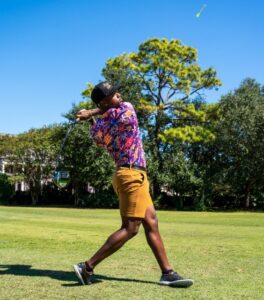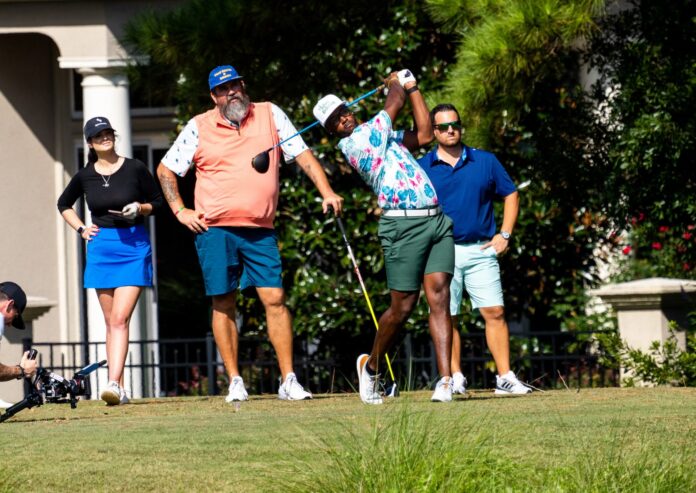After a decade spent legally hitting humans with as much viciousness as possible, James Anderson has transitioned to hitting a certain object with just as much ferocity.
Anderson ’05, a former Virginia Tech linebacker who spent 10 seasons in the NFL with four teams, has traded in his cleats for golf spikes, his helmet and shoulder pads for a driver, and the violent world of football for the sophisticated world of golf.
A little more than a year ago, Anderson, who graduated from Virginia Tech with a bachelor’s degree in studio art and a master’s degree in education, embarked on a career as a long drive competitor. To those unfamiliar with golf and with long drive competitions, the rules are simple: use a United States Golf Association-approved driver, swing as hard as possible, and try to hit a golf ball as far as possible while – and here’s the difficult part – also landing it within a grid roughly 45 to 60 yards wide.
“When I was playing in the NFL, I didn’t realize I was retired yet,” Anderson said. “That usually happens to most guys, so I spent a year, maybe a year and a half, still training and working out [in Los Angeles], trying to figure out what was going on.
“I ended up moving to Fort Lauderdale initially and then down to Miami, and I end up playing golf here with Wes Patterson [a professional long drive competitor]. He currently is still one of the top 15 to 20 guys in the world of long drive. I hit a few balls, and he’s like, ‘Hey, bro, you know you drive the ball pretty well. You’ve got a good name, clean background, you played in the NFL. There aren’t any guys on the long drive tour that have your story. Why don’t you give it a shot? You can probably be competitive. You’re an athlete. You can figure it out.’ So that started my long drive journey.”
With his wife’s blessing, Anderson, who lives in Miami with his wife and two young daughters, began preparing for a career. He started in the weight room, saying that he spent six or seven months working on his body. Tight hips and shoulders from years of football training and several injuries over the years originally hindered him from making a full turn golf swing.
Once he got his body in condition, the Chesapeake, Virginia, native started working with Trevor Salzman, a noted swing instructor in Aventura, Florida, on his swing. He spent hours hitting balls during each practice session.
“Golf is one of those things where you need repetition,” Anderson said. “You’ve got to condition your body to do it.”
Anderson participated as an amateur in several Professional Long Drive Association events this past summer, and he finished in the top four in two of them. He said his longest drive was 390 yards.
Originally, Anderson wanted to win, but he quickly realized that his rookie season would be one of learning. He hopes the lessons learned translate into future success.

“When you look at long drive, it highlights this thing about golf and kind of amps it up and almost puts it on steroids,” he said. “It’s a driver swing, but it’s to the extreme. You’re trying to get back from a rotation. … Like you take everything that’s athletic about a golf swing, and you’re really trying to max it out. I enjoy that intensity.
“The thing about golf is it’s just you. The competition’s against yourself. I like the fact that you can get in your own head and be competitive with yourself to figure out who you are on the course because the game of golf will show you who you are.”
Anderson, though, is more than just a golfer these days. He also serves as the vice president of a creative agency, putting his degree in studio art from Virginia Tech to good use, and he’s working with a tech start-up attempting to create artificial intelligence software for use by schools, churches, and businesses to identify weapons on people. As a girl dad, he jumped at the opportunity to get involved in this project.
In addition, Anderson is pursuing another passion. Shortly after moving to South Florida, Anderson enrolled at the University of Miami, and in 2020, he earned an MBA.
While doing so, Anderson became involved with a research project that served as his final thesis. The project called for developing a research institute and educational curriculum for children and their fathers. The name of the program is The Intentional Dad.
“If you look at resources that are made available, there are a lot of things for moms, help books and seminars and all this kind of stuff,” Anderson said. “On the father’s side, there are two issues. There aren’t as many resources made available, and a lot of fathers aren’t present for whatever scenario. Then, a lot of times how men are raised from an emotional standpoint — the whole mantra of men don’t cry, you got to be tough, you got to do all these kinds of things.
“Sometimes that doesn’t allow us to be emotionally available for our children. We haven’t historically done a good job at conflict resolution. … From that standpoint, offering men resources to help them deal with those things as well as conflict, I think is key, and it’s missing.”
So many varying interests keep Anderson’s schedule full, but despite the demands, he remains committed to becoming a success in his ventures, including on the long drive tour. The competitions, held throughout the United States, start later this spring. Being retired from football does not mean being retired as an athlete for him, and those competitive urges leave him anxiously awaiting.
“I wanted to give myself a chance to be competitive,” Anderson said. “If I didn’t give myself an honest chance to be competitive, then did I really do it? … If I’m going to invest this kind of money and invest in this kind of time, then I better be committed to win and try to really be competitive, or at this point, there’s no point in really doing it.”

